Pioneering for People
January saw a series of medical breakthroughs within the QF ecosystem, including the pioneering of a new treatment for a child with congenital hyperinsulinism – severe low blood sugar – by QF member Sidra Medicine.
The leading women’s and children’s hospital and medical research center also published a groundbreaking study on how short-term consumption of highly processed diets can impair the metabolism of the brain and sense of smell; while a Sidra Medicine study was recognized as a key advancement in the field of cancer microbiome.
And HBKU’s Qatar Biomedical Research Institute, working with the US’ University of Rhode Island, unveiled research presenting a potential avenue for treating Alzheimer’s disease.
No Need for Words
There was also a milestone for Hamad Bin Khalifa University Press, the QF-based publishing house, as it published its first wordless book, I Wish I Knew, by author Souha Abou Chakra and award-winning illustrator Zohreh Godini. Using only creative illustration, it invites readers to consider the potentially harmful effects of prolonged internet use.
January saw a series of medical breakthroughs within the QF ecosystem, including the pioneering of a new treatment for a child with congenital hyperinsulinism – severe low blood sugar – by QF member Sidra Medicine.
The leading women’s and children’s hospital and medical research center also published a groundbreaking study on how short-term consumption of highly processed diets can impair the metabolism of the brain and sense of smell; while a Sidra Medicine study was recognized as a key advancement in the field of cancer microbiome.
And HBKU’s Qatar Biomedical Research Institute, working with the US’ University of Rhode Island, unveiled research presenting a potential avenue for treating Alzheimer’s disease.
I am very proud to see the clinical research and treatment innovation under way at our hospital, that aids in the delivery of precision health programs for our patients.
Precision health research at Sidra Medicine is focused on:
- Human genetics
- Immunology
- Maternal and child health
The Impact of Research
As a leading medical journal ranked Qatar as the second-most productive country in the world for research on diabetes-related nerve damage, a QF researcher was highlighted for his role in the country’s standing in this field.
Dr. Rayaz Malik, professor of medicine and assistant dean for clinical investigations at WCM-Q, was involved in most of the published studies that led to Qatar’s ranking, saying: “It is extremely gratifying to see hard independent evidence that Qatar’s investment in biomedical research, especially diabetes, is having a global impact.”
Also in healthcare, a study by HBKU’s Qatar Biomedical Research Institute introduced an Arabic version of the Autism Risk Index, a promising tool for early screening and diagnosis of Autism Spectrum Disorder in the Arabic-speaking world.
QF’s Sidra Medicine, with Msheireb Museums, launched its Science Café series, which connects the public with scientists and engineers to explain their healthcare research in a conversational way; while Dr. Ryad Ghanam, a mathematics professor at QF partner university Virginia Commonwealth University School of the Arts in Qatar, outlined his work on modeling and monitoring COVID-19 in Qatar at two top international conferences.
As a leading medical journal ranked Qatar as the second-most productive country in the world for research on diabetes-related nerve damage, a QF researcher was highlighted for his role in the country’s standing in this field.
Dr. Rayaz Malik, professor of medicine and assistant dean for clinical investigations at WCM-Q, was involved in most of the published studies that led to Qatar’s ranking, saying: “It is extremely gratifying to see hard independent evidence that Qatar’s investment in biomedical research, especially diabetes, is having a global impact.”
Also in healthcare, a study by HBKU’s Qatar Biomedical Research Institute introduced an Arabic version of the Autism Risk Index, a promising tool for early screening and diagnosis of Autism Spectrum Disorder in the Arabic-speaking world.
QF’s Sidra Medicine, with Msheireb Museums, launched its Science Café series, which connects the public with scientists and engineers to explain their healthcare research in a conversational way; while Dr. Ryad Ghanam, a mathematics professor at QF partner university Virginia Commonwealth University School of the Arts in Qatar, outlined his work on modeling and monitoring COVID-19 in Qatar at two top international conferences.




Initiatives like the Science Café are our way to engage with the community and make science accessible to everyone, as well as applicable to their day-to-day lives.
A Step Into The Future
They are part of healthcare’s new generation – and in March, medical students at QF partner university Weill Cornell Medicine-Qatar (WCM-Q) celebrated gaining places on residency training programs at some of the world’s top healthcare institutions, at the university’s annual Match Day.
WCM-Q’s Qatar Medical Explorer Program also gave 30 high school students the chance to experience life as a medical student, while its Doctors of the Future Conference invited pre-university students to explore careers in medicine. Meanwhile, healthcare professionals from around the world gathered at WCM-Q to discuss advances in lifestyle medicine, through a symposium organized by the university’s Institute for Population Health explored how habits such as physical activity, nutrition and stress management can prevent, treat, and manage chronic diseases.
Innovating for the World
And students from across Education City showcased their innovation skills and their technological solutions for tackling challenging global issues through QF partner university Texas A&M University at Qatar’s (TAMUQ) Invent for the Planet competition, while the third edition of the Libraries Lead Forum – hosted by Education City-based Qatar National Library – focused on Artificial Intelligence and how libraries can ensure equitable access to information in the digital age.
They are part of healthcare’s new generation – and in March, medical students at QF partner university Weill Cornell Medicine-Qatar (WCM-Q) celebrated gaining places on residency training programs at some of the world’s top healthcare institutions, at the university’s annual Match Day.
WCM-Q’s Qatar Medical Explorer Program also gave 30 high school students the chance to experience life as a medical student, while its Doctors of the Future Conference invited pre-university students to explore careers in medicine. Meanwhile, healthcare professionals from around the world gathered at WCM-Q to discuss advances in lifestyle medicine, through a symposium organized by the university’s Institute for Population Health explored how habits such as physical activity, nutrition and stress management can prevent, treat, and manage chronic diseases.
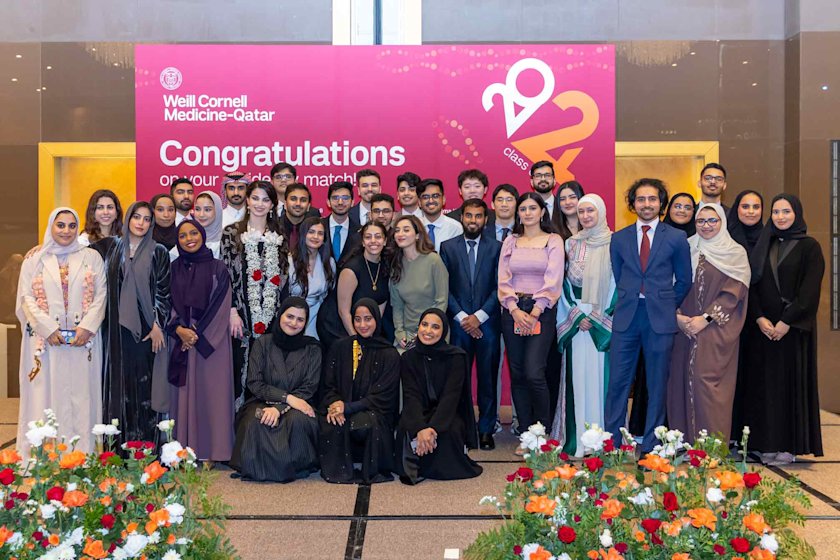
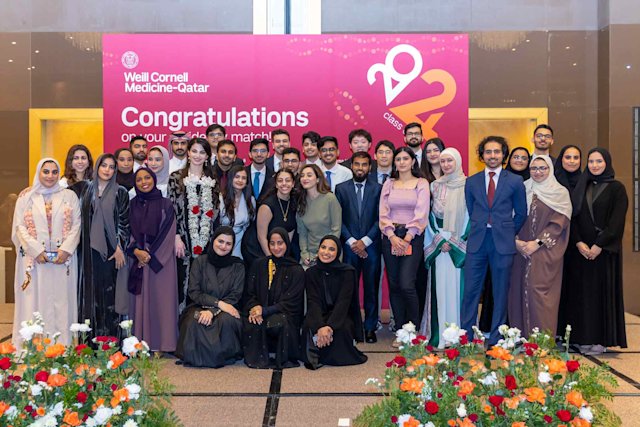
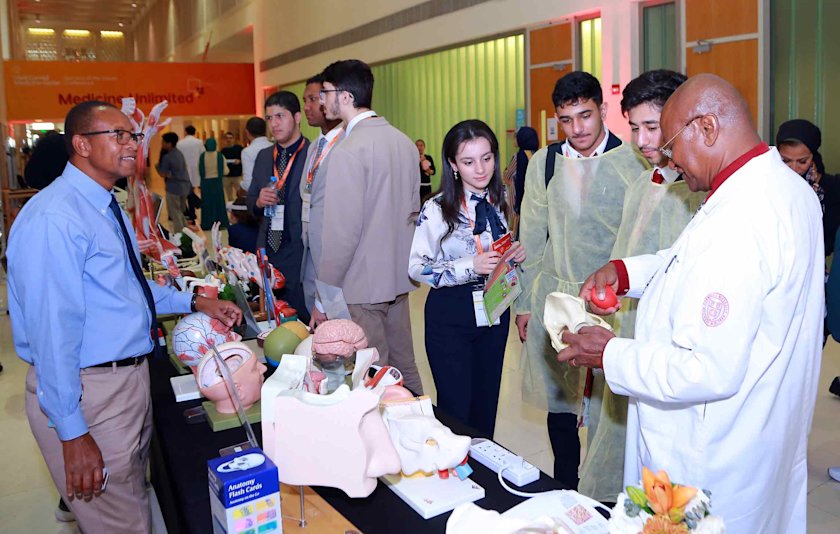
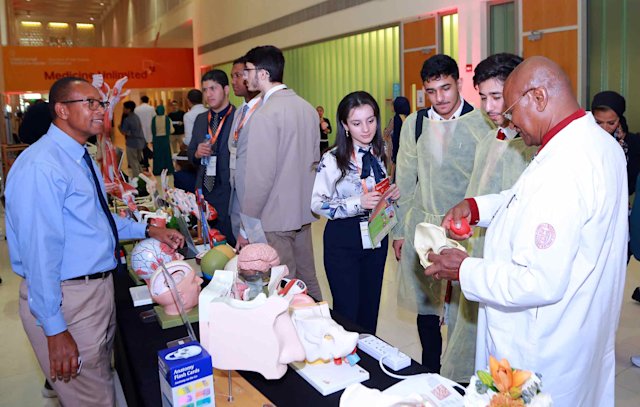
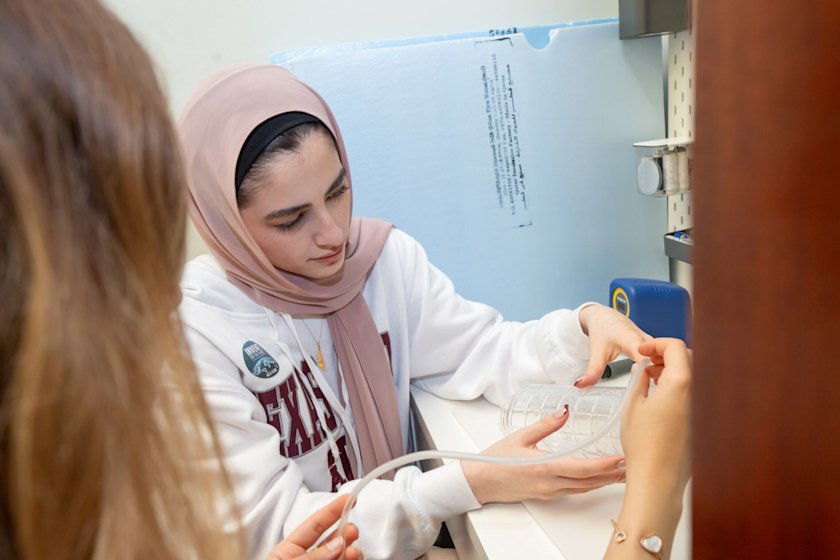
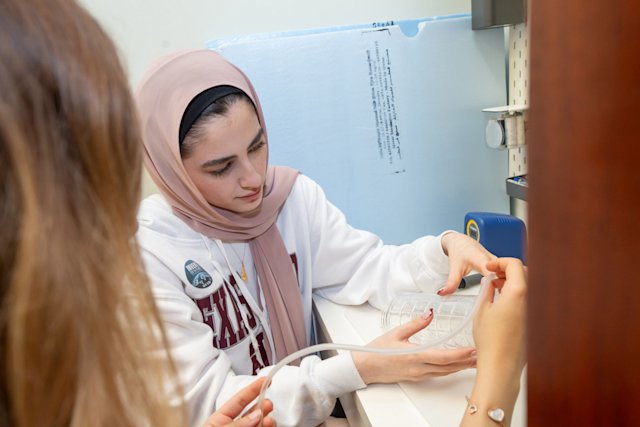
- Over 300 pre-university students attended WCM-Q’s Doctors of the Future Conference
- More than 360 healthcare professionals from 21 countries participated in WCM-Q’s lifestyle medicine symposium
- The winner of TAMUQ’s Invent for the Planet competition went on to compete against 24 universities from around the world in the global finals
A Healthcare Revolution
Personalized treatment, tailored to the specific needs of every person – it’s called precision health, and it has the potential to completely transform the way illnesses and disease are not just tackled, but prevented.
Qatar is positioning itself as a global pioneer in the field of precision health, with Qatar Foundation (QF) at the vanguard of this national effort. And in April came a landmark moment in the nation’s journey toward revolutionizing healthcare: the launch of Qatar Precision Health Institute (QPHI).
An umbrella institute bringing together existing strengths in health sciences and genomics within QF’s Qatar Biobank and Qatar Genome Programme, QPHI has been established to build on a decade of groundbreaking work by these two centers, and help accelerate the adoption of personalized healthcare in Qatar.
QPHI will support Qatar in delivering precision health by taking research findings from laboratories into clinics, where patients can directly benefit. It will unite precision health efforts across QF and Qatar, providing research-based evidence and information that reveals the effect of lifestyle, environment, and genetics on the country’s population.
Personalized treatment, tailored to the specific needs of every person – it’s called precision health, and it has the potential to completely transform the way illnesses and disease are not just tackled, but prevented.
Qatar is positioning itself as a global pioneer in the field of precision health, with Qatar Foundation (QF) at the vanguard of this national effort. And in April came a landmark moment in the nation’s journey toward revolutionizing healthcare: the launch of Qatar Precision Health Institute (QPHI).
An umbrella institute bringing together existing strengths in health sciences and genomics within QF’s Qatar Biobank and Qatar Genome Programme, QPHI has been established to build on a decade of groundbreaking work by these two centers, and help accelerate the adoption of personalized healthcare in Qatar.
QPHI will support Qatar in delivering precision health by taking research findings from laboratories into clinics, where patients can directly benefit. It will unite precision health efforts across QF and Qatar, providing research-based evidence and information that reveals the effect of lifestyle, environment, and genetics on the country’s population.
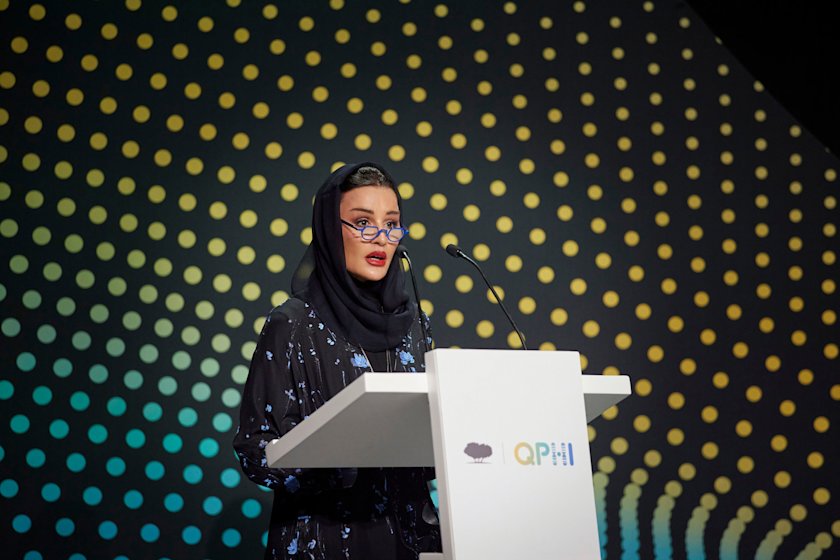
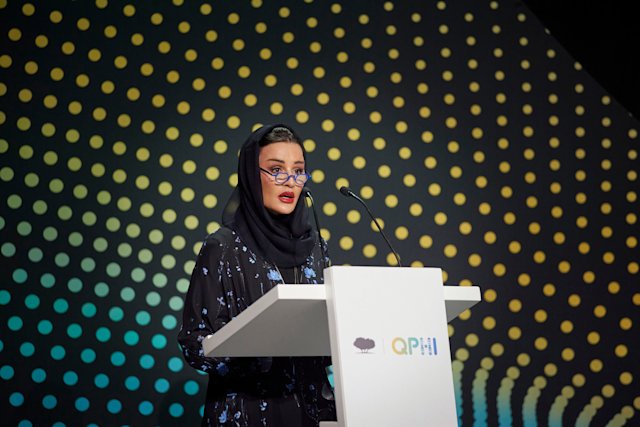
Qatar’s efforts have led to faster and more accurate diagnoses of multiple diseases for people from the region. QPHI is building on those successes and taking our knowledge forward to implement clinical solutions that will lead to a healthier future not only for our citizens, but for people around the world.
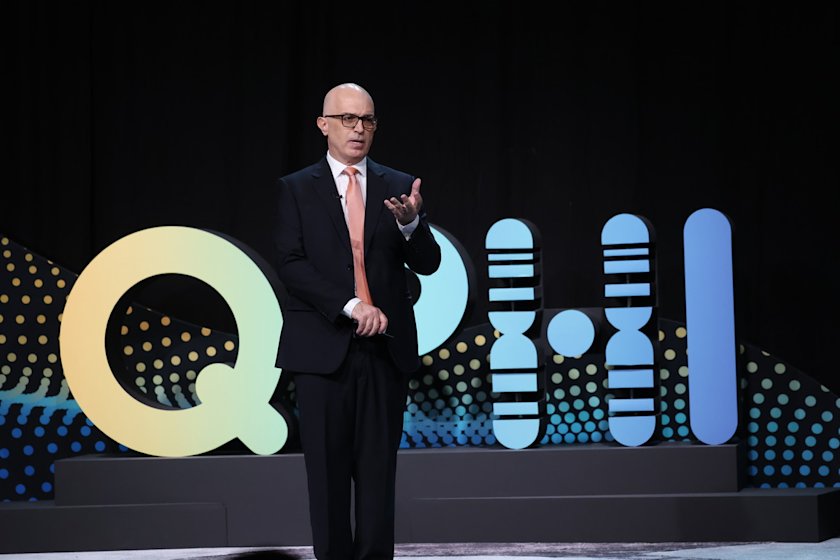
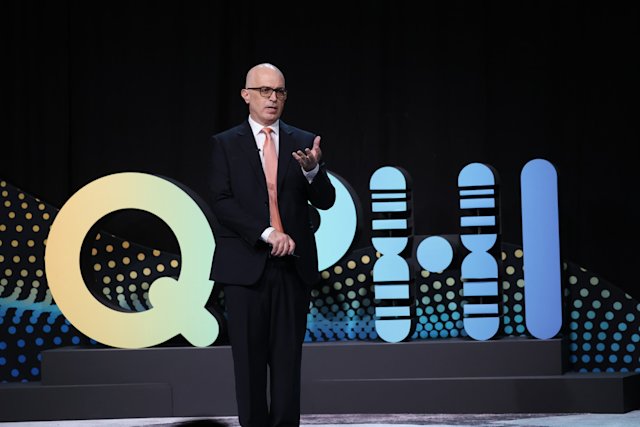
In the field of precision health, QPHI will:
- Identify key clinical focus areas that reflect the needs of Qatar
- Scale up precision medicine for use in clinical practice
- Establish a policy program to provide guidance and clarity in precision health
The Foundations of Impact
As QPHI was officially launched, experts and leaders from across Qatar’s health sector explored how the foundations are being laid to allow personalized medicine to be brought into clinical use.
A panel discussion at Education City – attended by Her Highness Sheikha Moza bint Nasser, Chairperson of Qatar Foundation – also looked at how Qatar’s efforts to adopt precision health practices are being supported, and ways of enhancing cooperation and knowledge exchange within the healthcare field to bridge the gaps between research, practice, and clinical application.
And the QPHI launch also saw experts highlight how precision health is already having a positive impact on people’s lives in Qatar, reducing the number of deaths from cardiovascular disease. Genomic data from samples collected by QPHI’s Qatar Biobank has revealed mutations that cause heart disease in Qatari citizens, and the discovery of – and access to – this information is helping healthcare practitioners treat cardiovascular patients more effectively and in a targeted way.
“We’ve now surpassed 40,000 whole genomes being sequenced, and we’ve launched dozens of cutting-edge initiatives that allowed us to take our spot within the ‘Champions League’ of major global precision health projects,” said Dr. Wadha Al-Muftah, Senior Director of QPHI’s Qatar Genome Programme.
As QPHI was officially launched, experts and leaders from across Qatar’s health sector explored how the foundations are being laid to allow personalized medicine to be brought into clinical use.
A panel discussion at Education City – attended by Her Highness Sheikha Moza bint Nasser, Chairperson of Qatar Foundation – also looked at how Qatar’s efforts to adopt precision health practices are being supported, and ways of enhancing cooperation and knowledge exchange within the healthcare field to bridge the gaps between research, practice, and clinical application.
And the QPHI launch also saw experts highlight how precision health is already having a positive impact on people’s lives in Qatar, reducing the number of deaths from cardiovascular disease. Genomic data from samples collected by QPHI’s Qatar Biobank has revealed mutations that cause heart disease in Qatari citizens, and the discovery of – and access to – this information is helping healthcare practitioners treat cardiovascular patients more effectively and in a targeted way.
“We’ve now surpassed 40,000 whole genomes being sequenced, and we’ve launched dozens of cutting-edge initiatives that allowed us to take our spot within the ‘Champions League’ of major global precision health projects,” said Dr. Wadha Al-Muftah, Senior Director of QPHI’s Qatar Genome Programme.
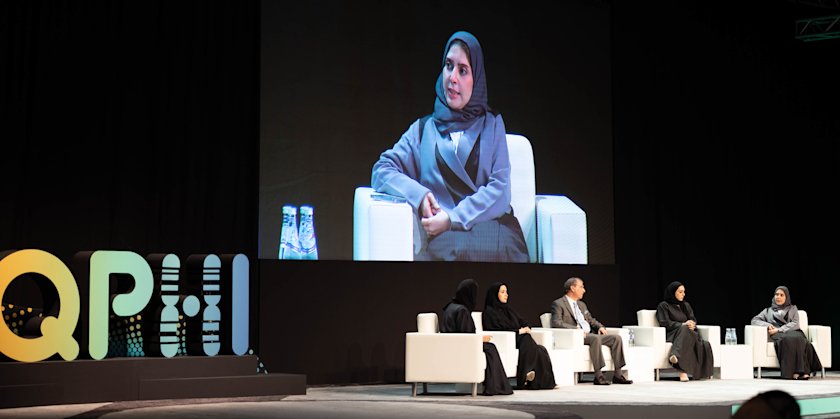
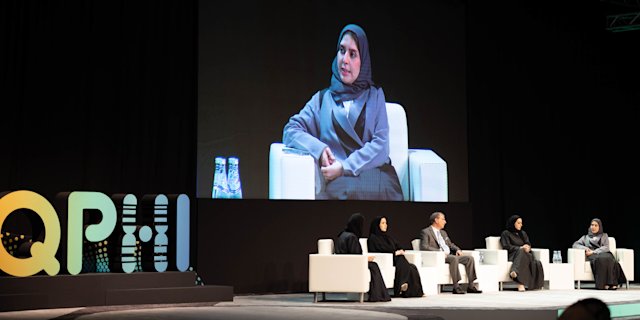
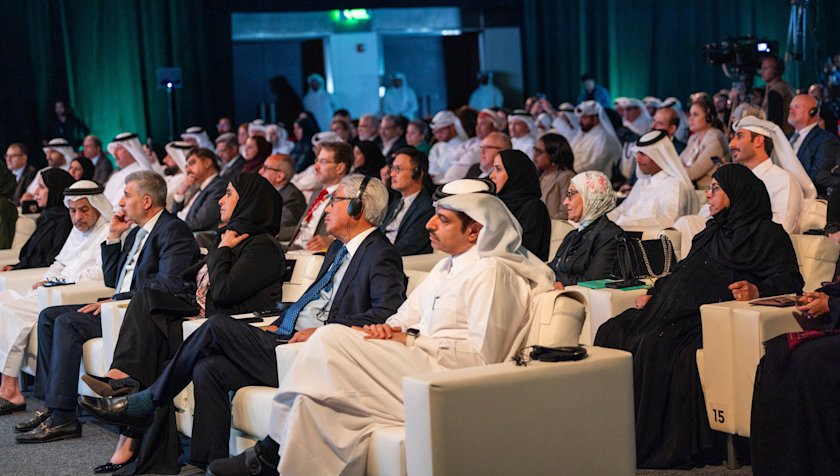
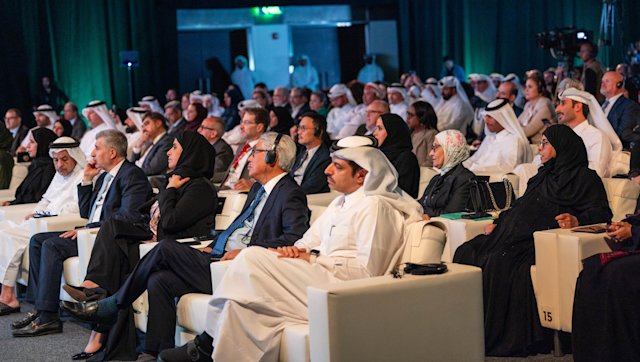
Through cooperation with other scientific institutions, such as QPHI’s Qatar Biobank and Qatar Genome Programme, we are now treating the disease before it occurs through proactive measures.
Interacting for Understanding
From providing inclusive sports opportunities to using technology to foster inclusion and conducting groundbreaking research, a dedication to supporting those with autism is seen in so many ways across the QF ecosystem.
During April, in recognition of the month’s focus on autism awareness, QF member Hamad Bin Khalifa University’s Qatar Biomedical Research Institute (QBRI) collaborated with the Ministry of Education and Higher Education to host an interactive educational session on autism for primary school students, introducing them to the complexities of autism. Further sessions are planned in future.
QBRI also held a seminar on disseminating knowledge about autism and published a research paper titled ‘From Surviving to Thriving’, which emphasized the importance of fostering awareness and acceptance of, and appreciation, for people with autism and other neurological conditions.
Meanwhile, QF member Sidra Medicine’s longstanding BARAKA-Qatar study, focusing on Middle Eastern genetics and their implications for autism, has not only enhanced autism understanding in the Arab world, but also helped to bring the genetics of the region to global attention.
From providing inclusive sports opportunities to using technology to foster inclusion and conducting groundbreaking research, a dedication to supporting those with autism is seen in so many ways across the QF ecosystem.
During April, in recognition of the month’s focus on autism awareness, QF member Hamad Bin Khalifa University’s Qatar Biomedical Research Institute (QBRI) collaborated with the Ministry of Education and Higher Education to host an interactive educational session on autism for primary school students, introducing them to the complexities of autism. Further sessions are planned in future.
QBRI also held a seminar on disseminating knowledge about autism and published a research paper titled ‘From Surviving to Thriving’, which emphasized the importance of fostering awareness and acceptance of, and appreciation, for people with autism and other neurological conditions.
Meanwhile, QF member Sidra Medicine’s longstanding BARAKA-Qatar study, focusing on Middle Eastern genetics and their implications for autism, has not only enhanced autism understanding in the Arab world, but also helped to bring the genetics of the region to global attention.
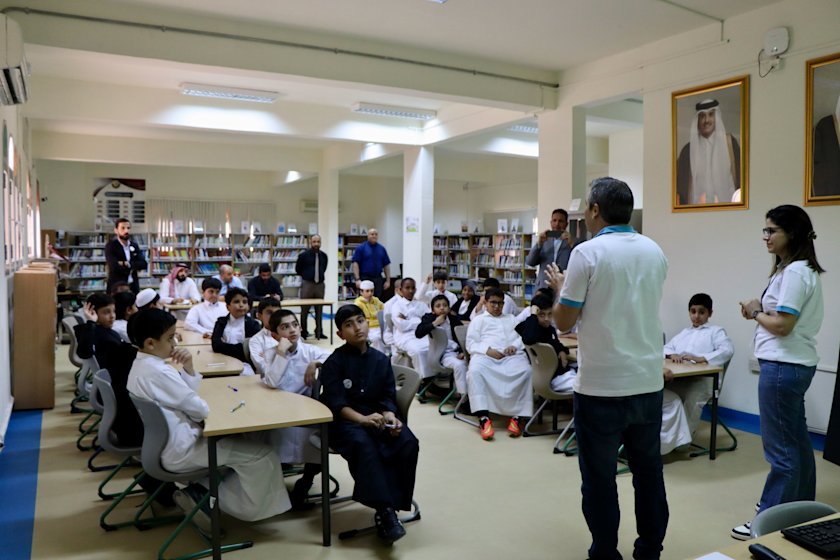
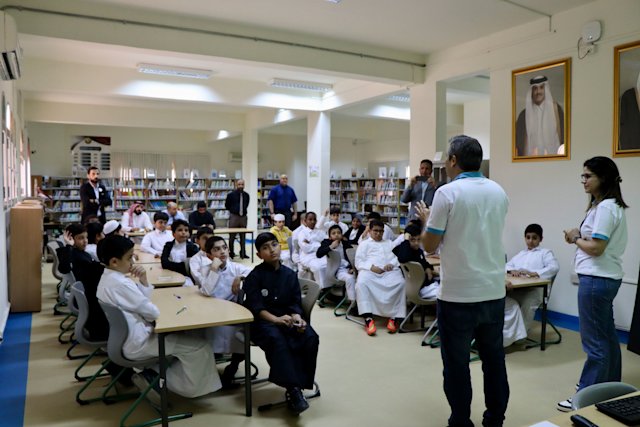
As parents, we work closely with the academy’s teachers to integrate technology into the educational process for our children.
A Guide to Saving Lives
With approximately one in six children living in a conflict zone, the ability of clinicians to swiftly and effectively treat life-changing injuries is vital – and, in April, QF’s World Innovation Summit for Health (WISH) announced a new means of supporting them.
Developed in Arabic and English by WISH and the UK-based Paediatric Blast Injury Partnership, the Pediatric Trauma Pain Management Manual provides clinicians with a guide to managing children’s pain both in the immediate aftermath of their injury, but also in the months and years afterwards. Initially, the manual is targeted at supporting clinicians in Gaza.
Entering a Diverse World
Meanwhile, Qatar Foundation International (QFI) contributed to the publication of Mosaic of Tongues: Multilingual Learning for the Arabic-Speaking World: a unique collection of essays delving into the diverse world of multilingualism within the Arab region and throughout its diaspora.
And in advancing and expanding thought leadership on Arabic language education, on a global scale, QFI followed its involvement at a leading international education conference in March by sponsoring and participating in the Fourth Biennial Arabic Language Teaching and Learning in Higher Education Conference at the University of Cambridge in the UK.
With approximately one in six children living in a conflict zone, the ability of clinicians to swiftly and effectively treat life-changing injuries is vital – and, in April, QF’s World Innovation Summit for Health (WISH) announced a new means of supporting them.
Developed in Arabic and English by WISH and the UK-based Paediatric Blast Injury Partnership, the Pediatric Trauma Pain Management Manual provides clinicians with a guide to managing children’s pain both in the immediate aftermath of their injury, but also in the months and years afterwards. Initially, the manual is targeted at supporting clinicians in Gaza.
Working together with the Paediatric Blast Injury Partnership and WISH, we have the best chance of developing a Pediatric Pain Management Manual that will provide vital support to healthcare professionals working on the ground in conflict zones in Gaza and elsewhere.
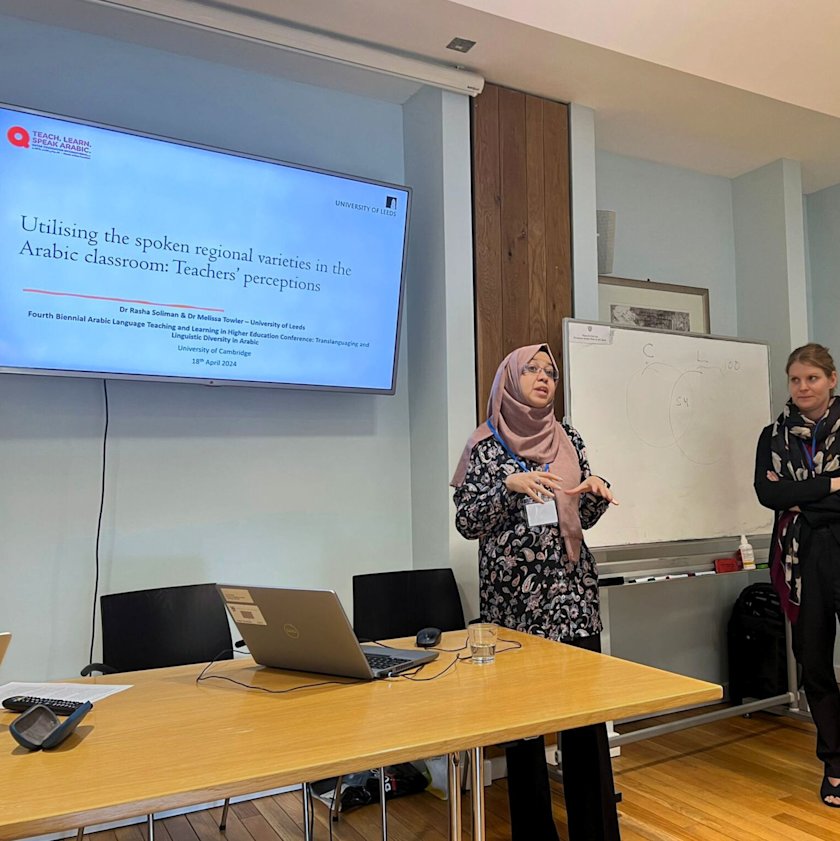
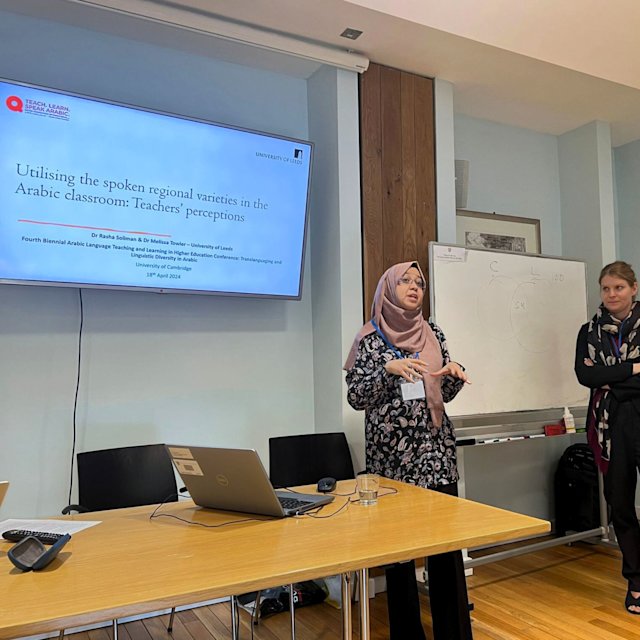
Mosaic of Tongues, supported by QFI, explores themes including:
- Teaching Arabic to non-native speakers
- The role of identity in language acquisition
- Pathways to bilingualism in the Middle East
- The impact of digital technology on the Arabic language
A Healthcare First
Healthcare efforts at QF in May also saw Sidra Medicine announce the establishment of Qatar’s first-ever pediatric hematopoietic stem cell transplant program, partnering with the Children’s Hospital of Philadelphia (CHOP) – one of the world’s best in the field of pediatrics.
Supported by CHOP’s expertise and educational capacity, the program is focused on treating patients with various blood diseases and cancers, with its announcement coming in the same month as international authorities on primary immune regulatory disorders – which affect the body’s ability to fight immune responses – gathered at Sidra Medicine for an inaugural conference on this topic.
HBKU’s Qatar Biomedical Research Institute (QBRI) and Oman’s Sultan Qaboos University commenced an in-depth study of genetic factors involved in autism; while a WCM-Q research team published landmark findings how proteins can fight a wide range of diseases, and one of the university’s researchers received a prestigious international fellowship recognizing his contribution to Artificial Intelligence studies.
Meanwhile, WCM-Q’s LifeHub pavilion – which, throughout Expo 2023 Doha, showcased the potential of a future where innovation, research and development, and Artificial Intelligence, drive better health and greater sustainability – was named the most innovative corporate social responsibility initiative of 2024 at the Qatar CSR Summit.
Healthcare efforts at QF in May also saw Sidra Medicine announce the establishment of Qatar’s first-ever pediatric hematopoietic stem cell transplant program, partnering with the Children’s Hospital of Philadelphia (CHOP) – one of the world’s best in the field of pediatrics.
Supported by CHOP’s expertise and educational capacity, the program is focused on treating patients with various blood diseases and cancers, with its announcement coming in the same month as international authorities on primary immune regulatory disorders – which affect the body’s ability to fight immune responses – gathered at Sidra Medicine for an inaugural conference on this topic.
HBKU’s Qatar Biomedical Research Institute (QBRI) and Oman’s Sultan Qaboos University commenced an in-depth study of genetic factors involved in autism; while a WCM-Q research team published landmark findings how proteins can fight a wide range of diseases, and one of the university’s researchers received a prestigious international fellowship recognizing his contribution to Artificial Intelligence studies.
Meanwhile, WCM-Q’s LifeHub pavilion – which, throughout Expo 2023 Doha, showcased the potential of a future where innovation, research and development, and Artificial Intelligence, drive better health and greater sustainability – was named the most innovative corporate social responsibility initiative of 2024 at the Qatar CSR Summit.
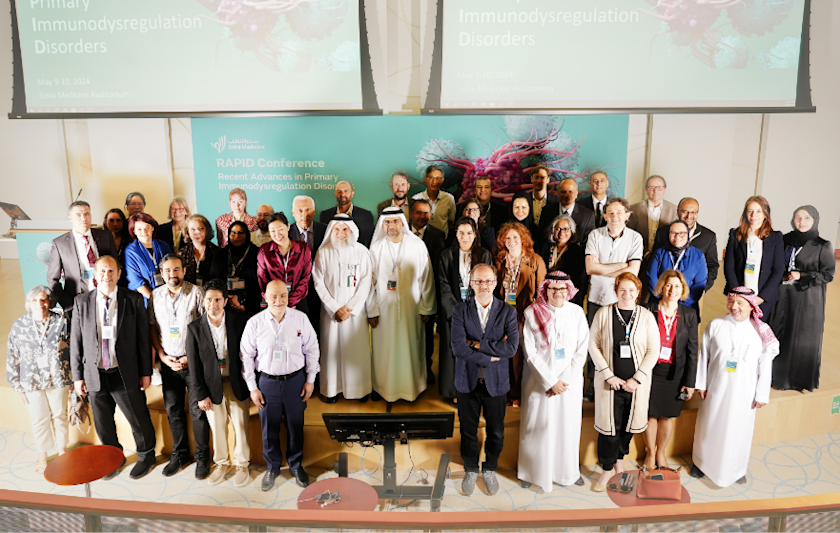
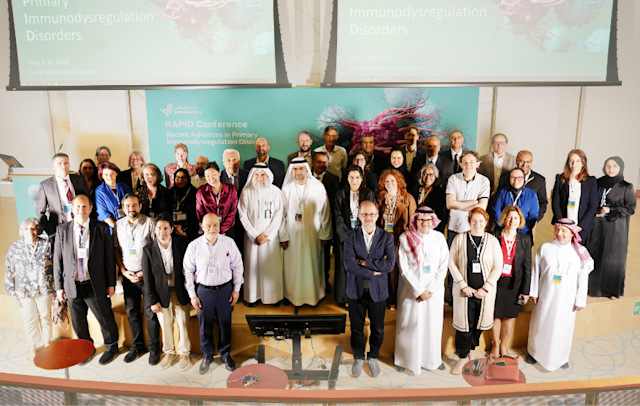
This collaborative endeavor aims to contribute to the global scientific understanding of the genetic basis of Autism Spectrum Disorder, paving the way for improved care and support for individuals affected by ASD in Oman, Qatar, and beyond.
Sidra Medicine is the only hospital in Qatar to provide pediatric hematology and oncology care for children and young people with cancer and blood disorders.
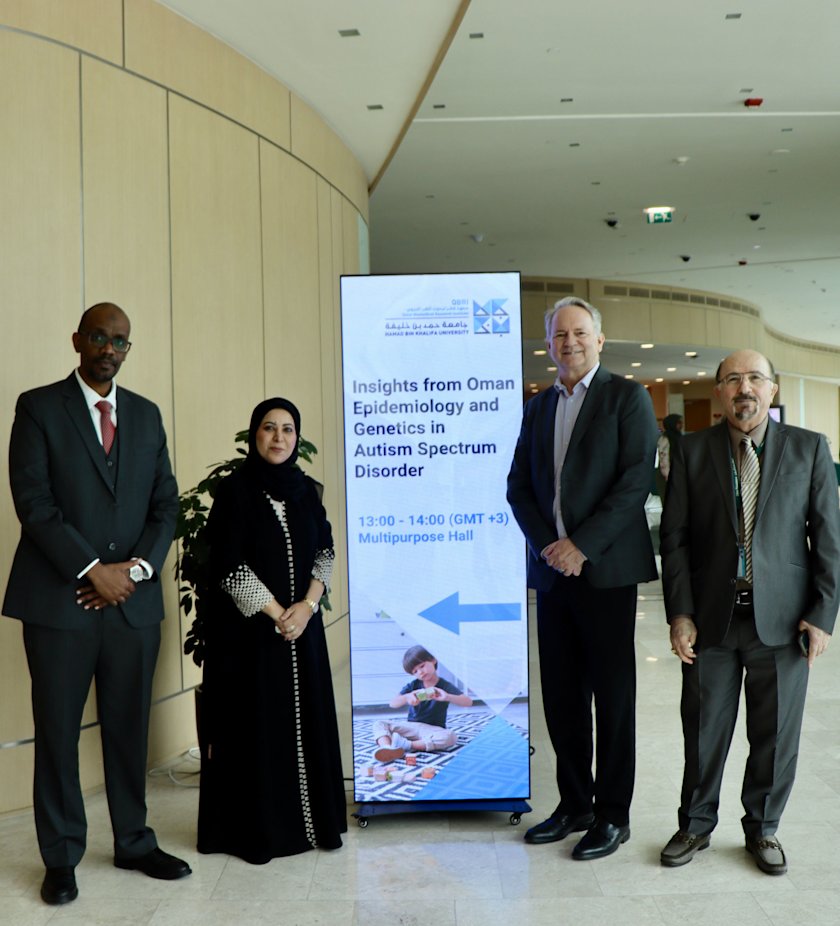
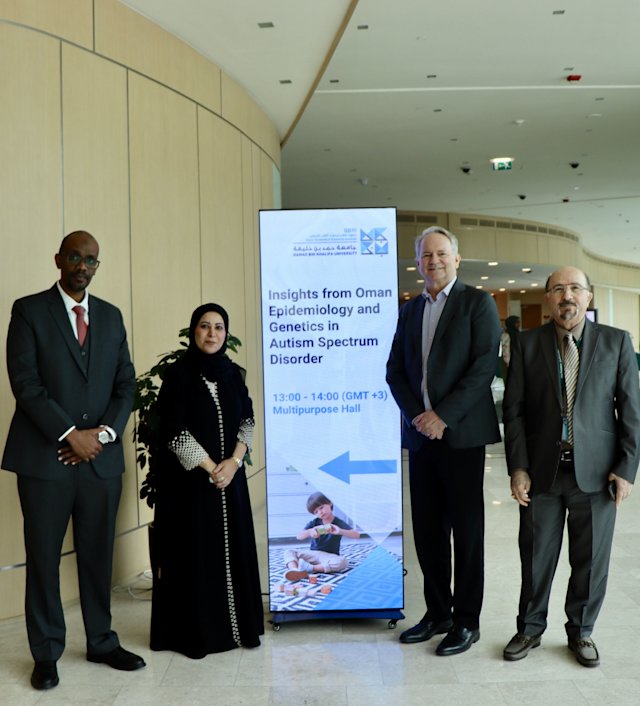
Envisaging a New Age
And a fitness-focused entrepreneur who wants to change the game for health-centered innovation at QF in May to talk tech – in the latest edition of QF’s platform for dialogue, the Education City Speaker Series.
In his public talk, Will Ahmed, Founder and CEO of WHOOP – which develops next-generation wearable technology for optimizing health – explained how Artificial Intelligence will ultimately evolve to the point where it becomes a 24/7 coach, trainer, nutritionist, and doctor for wearers of such devices.
AI is already a key component of WHOOP’s technology, with its devices allowing users to ask questions about their health and fitness routine. But, as Ahmed explained, it is set to go much further.
“I think the power of health monitoring is that it will be able to predict illnesses, heart attacks, strokes, diseases, and all sorts of things,” he said. “And I do feel that, in the next three to five years, we are going to see this massive golden age for health awareness.
“I really believe we’re going to see an unbelievable growth in preventative medicine.”
And a fitness-focused entrepreneur who wants to change the game for health-centered innovation at QF in May to talk tech – in the latest edition of QF’s platform for dialogue, the Education City Speaker Series.
In his public talk, Will Ahmed, Founder and CEO of WHOOP – which develops next-generation wearable technology for optimizing health – explained how Artificial Intelligence will ultimately evolve to the point where it becomes a 24/7 coach, trainer, nutritionist, and doctor for wearers of such devices.
AI is already a key component of WHOOP’s technology, with its devices allowing users to ask questions about their health and fitness routine. But, as Ahmed explained, it is set to go much further.
“I think the power of health monitoring is that it will be able to predict illnesses, heart attacks, strokes, diseases, and all sorts of things,” he said. “And I do feel that, in the next three to five years, we are going to see this massive golden age for health awareness.
“I really believe we’re going to see an unbelievable growth in preventative medicine.”
An Ethical Dialogue
In June, a global gathering of knowledge and expertise in the field of bioethics came to Doha for the first time – with QF as its location.
The 17th World Congress of Bioethics was hosted by the Research Center for Islamic Legislation and Ethics (CILE) within QF member Hamad Bin Khalifa University’s (HBKU) College of Islamic Studies, in collaboration QF’s World Innovation Summit for Health (WISH). With attendees including Her Highness Sheikha Moza bint Nasser, Chairperson of Qatar Foundation, it enabled dialogue on vital bioethical issues, particularly in religious and cultural contexts.
Facing Up to Challenges
The month also saw WISH announce the impending publication of a report on the ethics of Artificial Intelligence in healthcare, exploring some of the more common adoptions of the technology in health and the associated ethical challenges – with an emphasis on approaching this issue from an Islamic perspective.
“Both secular and religious moral traditions need to grapple with serious ethical challenges surrounding the use of AI in healthcare,” said Dr. Mohammed Ghaly, Professor of Islam and Biomedical Ethics and Head of CILE. “Our report will provide policy recommendations for how we can address these concerns, which influence the ethical deliberations on the patient-physician relationship in the age of AI-enabled healthcare.”
In June, a global gathering of knowledge and expertise in the field of bioethics came to Doha for the first time – with QF as its location.
The 17th World Congress of Bioethics was hosted by the Research Center for Islamic Legislation and Ethics (CILE) within QF member Hamad Bin Khalifa University’s (HBKU) College of Islamic Studies, in collaboration QF’s World Innovation Summit for Health (WISH). With attendees including Her Highness Sheikha Moza bint Nasser, Chairperson of Qatar Foundation, it enabled dialogue on vital bioethical issues, particularly in religious and cultural contexts.




The role of religion is a critical one in the biomedical area. Discussions shaping bioethical policies should not neglect people’s beliefs, as they are part of our lives.
Collaboration, Discovery, Learning
From education and engagement to partnerships and discovery, the QF ecosystem remained a hive of activity entering summer.
HBKU teamed up with NASA to explore technology collaborations in quantum computing, while the university’s Qatar Biomedical Research Institute released a new study uncovering the role of a particular set of molecules in understanding neurological disorders.
Meanwhile, researchers at QF partner university Weill Cornell Medicine-Qatar (WCM-Q) made new breakthroughs surrounding the molecular processes that cause diabetes, and eight aspiring scientists graduated from the university’s Biomedical Research Training Program for Nationals, with QF’s Sidra Medicine making whole genome sequencing available – a method that allows more personalized, accurate, and swift diagnoses in pediatric healthcare.
And faculty and researchers from QF partner university Northwestern University in Qatar’s Institute for Advanced Study in the Global South presented their work at two top international communication conferences, while fellow partner university Texas A&M University at Qatar (TAMUQ) provided students visiting Qatar with an immersive engineering experience.
From education and engagement to partnerships and discovery, the QF ecosystem remained a hive of activity entering summer.
HBKU teamed up with NASA to explore technology collaborations in quantum computing, while the university’s Qatar Biomedical Research Institute released a new study uncovering the role of a particular set of molecules in understanding neurological disorders.
Meanwhile, researchers at QF partner university Weill Cornell Medicine-Qatar (WCM-Q) made new breakthroughs surrounding the molecular processes that cause diabetes, and eight aspiring scientists graduated from the university’s Biomedical Research Training Program for Nationals, with QF’s Sidra Medicine making whole genome sequencing available – a method that allows more personalized, accurate, and swift diagnoses in pediatric healthcare.
And faculty and researchers from QF partner university Northwestern University in Qatar’s Institute for Advanced Study in the Global South presented their work at two top international communication conferences, while fellow partner university Texas A&M University at Qatar (TAMUQ) provided students visiting Qatar with an immersive engineering experience.
My practical experience has ignited a deeper passion for my chosen field, driving my anticipation to delve into the field of research I have long dreamed of.


Unlocking Innovation
Entrepreneurs and startups with groundbreaking ideas on how to tackle the world’s most urgent healthcare challenges were issued with an invitation to put forward their solutions by QF’s global healthcare initiative, the World Innovation Summit for Health (WISH).
Over the summer, WISH launched its 2024 Innovation Competition, giving those selected the opportunity to showcase their solutions and pitch them to global heath leaders at the WISH 2024 Summit later in the year.
The competition – with a specific focus on digital healthcare - comprises categories for ‘Young Innovators’, targeting health startups led by founders aged 30 and under, and ‘Innovation Showcases’ for startups that have had an established market presence for up to five years. As well as securing an international platform for their ideas, the successful innovators and entrepreneurs gain access to vital networking opportunities and support from industry experts.
“WISH believes that young entrepreneurs are vital to transformative health solutions, and this competition aims to provide them with a platform to showcase their early-stage startups,” said Maha El Akoum, Manager of Policy and Content, WISH.
Entrepreneurs and startups with groundbreaking ideas on how to tackle the world’s most urgent healthcare challenges were issued with an invitation to put forward their solutions by QF’s global healthcare initiative, the World Innovation Summit for Health (WISH).
Over the summer, WISH launched its 2024 Innovation Competition, giving those selected the opportunity to showcase their solutions and pitch them to global heath leaders at the WISH 2024 Summit later in the year.
The competition – with a specific focus on digital healthcare - comprises categories for ‘Young Innovators’, targeting health startups led by founders aged 30 and under, and ‘Innovation Showcases’ for startups that have had an established market presence for up to five years. As well as securing an international platform for their ideas, the successful innovators and entrepreneurs gain access to vital networking opportunities and support from industry experts.
“WISH believes that young entrepreneurs are vital to transformative health solutions, and this competition aims to provide them with a platform to showcase their early-stage startups,” said Maha El Akoum, Manager of Policy and Content, WISH.
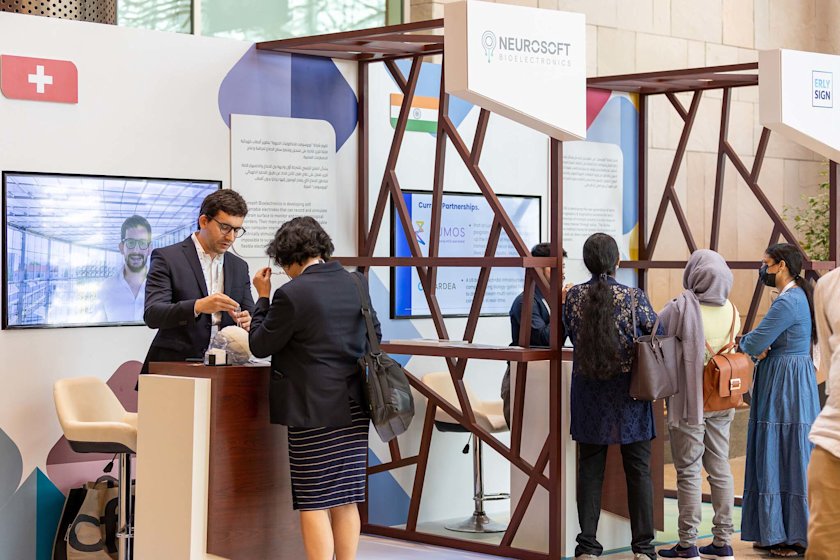
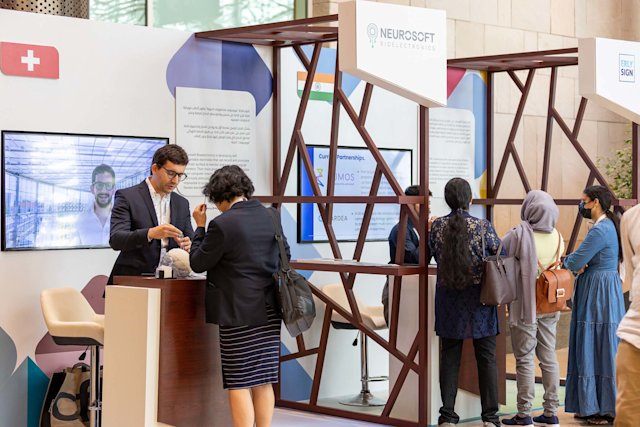
The opportunities that came from being shortlisted were extraordinary…It was a profound journey from the moment we were selected.
Breaking New Ground
Meanwhile, a piece of healthcare history was made at Education City, as QF’s pioneering women’s and children’s hospital and medical research center, Sidra Medicine, became the first hospital in Qatar – and only the fifth worldwide – to administer a revolutionary gene therapy medication.
Elevidys is the only such medication available to treat Duchenne Muscular Dystrophy, the most common inherited muscle disorder which can start to affect children between the ages of two and three years. It is now being administered in Qatar through Sidra Medicine’s gene therapy program, which provides life-saving treatment for rare genetic disorders.
And a study by QF’s Qatar Precision Health Institute and QF member Hamad Bin Khalifa University’s (HBKU) College of Health and Life Sciences revealed important insights into the genetic basis of diseases among the Qatari population.
The research, published in the European Journal of Human Genetics, found that 3.5 percent of Qataris carry medically actionable genetic variants, a finding that could transform personalized medical treatments in the region by supporting the development of targeted medical interventions.
Meanwhile, a piece of healthcare history was made at Education City, as QF’s pioneering women’s and children’s hospital and medical research center, Sidra Medicine, became the first hospital in Qatar – and only the fifth worldwide – to administer a revolutionary gene therapy medication.
Elevidys is the only such medication available to treat Duchenne Muscular Dystrophy, the most common inherited muscle disorder which can start to affect children between the ages of two and three years. It is now being administered in Qatar through Sidra Medicine’s gene therapy program, which provides life-saving treatment for rare genetic disorders.
And a study by QF’s Qatar Precision Health Institute and QF member Hamad Bin Khalifa University’s (HBKU) College of Health and Life Sciences revealed important insights into the genetic basis of diseases among the Qatari population.
The research, published in the European Journal of Human Genetics, found that 3.5 percent of Qataris carry medically actionable genetic variants, a finding that could transform personalized medical treatments in the region by supporting the development of targeted medical interventions.
Adding a treatment protocol for Duchenne Muscular Dystrophy is another milestone for Sidra Medicine, showcasing our leadership as an expert in the field of personalized medicine for children with genetic diseases.
This study not only enhances our understanding of the genetic predispositions in the Qatari population, but also establishes a solid foundation for personalized healthcare strategies in Qatar.
Mapping the Path to Health
Healthcare advancements at Education City over the summer also included the creation of an intricate molecular map of the human body by researchers at QF partner university Weill Cornell Medicine-Qatar (WCM-Q) – which can support discovery of the underlying factors of diseases.
Meanwhile, WCM-Q teamed up with the University of São Paulo to host a global congress on precision health innovations and education, while three of its alumni were among the inaugural recipients of the Qatar Medical Specialization Certificate, which ensures the highest global standards of medical practice in Qatar.
Faculty and students from QF partner university Georgetown University in Qatar (GU-Q), added their voices to discussions about the teaching and learning of bioethics as Doha staged the 17th World Congress of Bioethics, the largest global gathering of experts in this field.
And in a worldwide field of almost 1,000 applicants, GU-Q student Ranneme Abu-Hajar was chosen as one of just 15 Rangel Scholars for 2024, an honor awarded by the US State Department and Harvard University that nurtures future leaders in public service and international diplomacy.
Healthcare advancements at Education City over the summer also included the creation of an intricate molecular map of the human body by researchers at QF partner university Weill Cornell Medicine-Qatar (WCM-Q) – which can support discovery of the underlying factors of diseases.
Meanwhile, WCM-Q teamed up with the University of São Paulo to host a global congress on precision health innovations and education, while three of its alumni were among the inaugural recipients of the Qatar Medical Specialization Certificate, which ensures the highest global standards of medical practice in Qatar.
Faculty and students from QF partner university Georgetown University in Qatar (GU-Q), added their voices to discussions about the teaching and learning of bioethics as Doha staged the 17th World Congress of Bioethics, the largest global gathering of experts in this field.
And in a worldwide field of almost 1,000 applicants, GU-Q student Ranneme Abu-Hajar was chosen as one of just 15 Rangel Scholars for 2024, an honor awarded by the US State Department and Harvard University that nurtures future leaders in public service and international diplomacy.
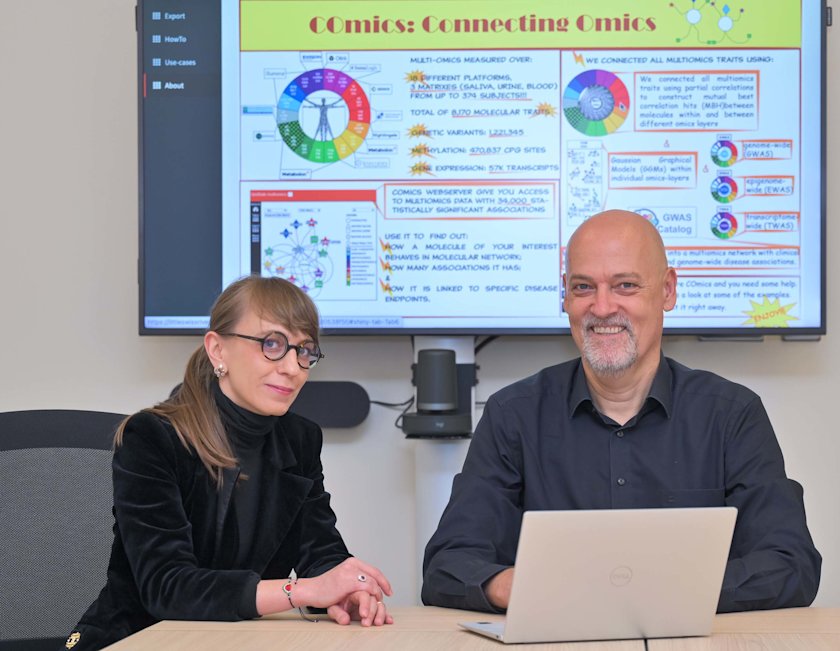
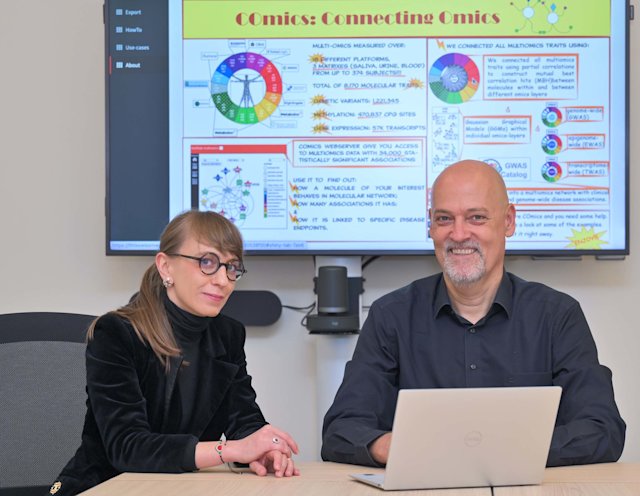
As part of our commitment to enhancing the entire health span, we must work together to build a future where healthcare is participatory, proactive, and precise.
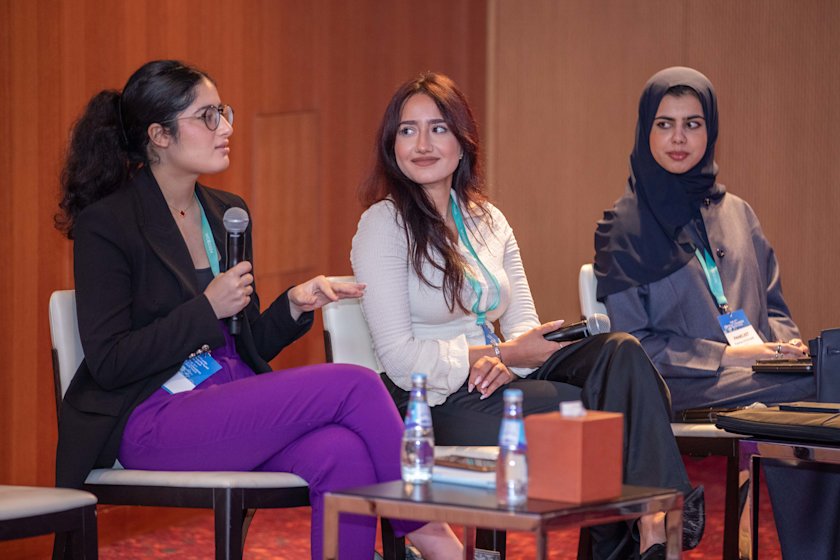
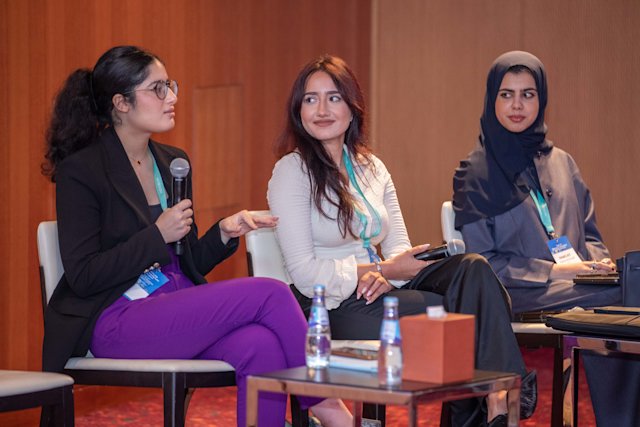
Leaving No One Behind
September saw leaders from across the world converge on New York for the 79th session of the United Nations General Assembly – and Qatar Foundation (QF) was there to send a message about the future of precision health.
In a session on the sidelines of the event, hosted by QF and the Permanent Mission of the State of Qatar to the United Nations, Qatar’s efforts, advances, and ambitions in the field of personalized healthcare were outlined to an international audience of scientists, academics, and policy and health leaders.
And it also contained a call for precision healthcare to be made available to all, with Dr. Hilal Lashuel, Research, Development, and Innovation Adviser to the Chairperson’s Office and Executive Director of Research, Development and Innovation at QF telling the session: “If a population is underrepresented in research today, it will be underserved by the precision health solutions of tomorrow.
“Developing diagnostics and therapies based on data from only one population or ancestry risks reinforcing existing health inequalities and leaving large segments behind.”
September saw leaders from across the world converge on New York for the 79th session of the United Nations General Assembly – and Qatar Foundation (QF) was there to send a message about the future of precision health.
In a session on the sidelines of the event, hosted by QF and the Permanent Mission of the State of Qatar to the United Nations, Qatar’s efforts, advances, and ambitions in the field of personalized healthcare were outlined to an international audience of scientists, academics, and policy and health leaders.
And it also contained a call for precision healthcare to be made available to all, with Dr. Hilal Lashuel, Research, Development, and Innovation Adviser to the Chairperson’s Office and Executive Director of Research, Development and Innovation at QF telling the session: “If a population is underrepresented in research today, it will be underserved by the precision health solutions of tomorrow.
“Developing diagnostics and therapies based on data from only one population or ancestry risks reinforcing existing health inequalities and leaving large segments behind.”
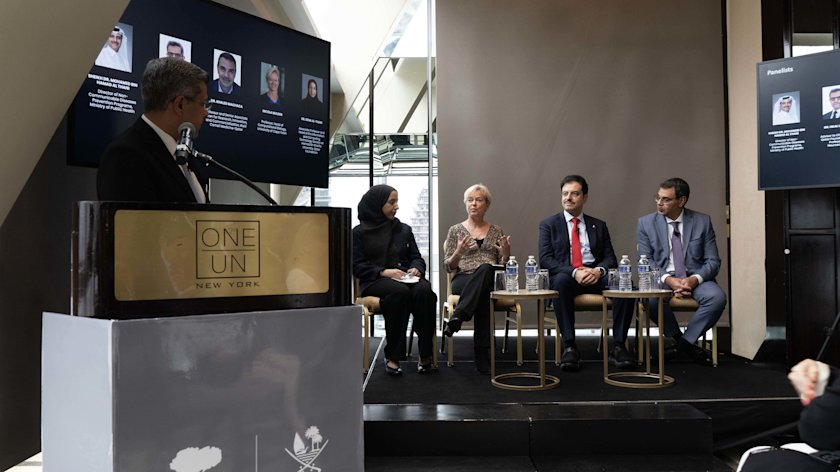
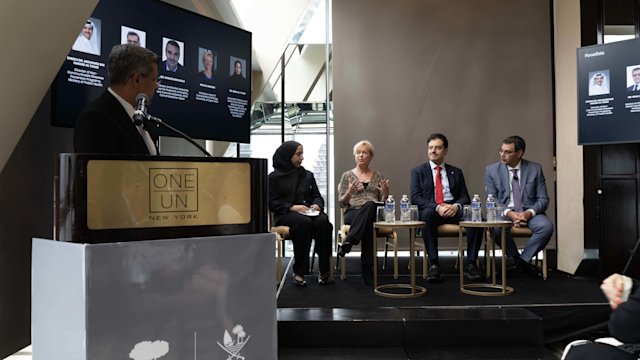
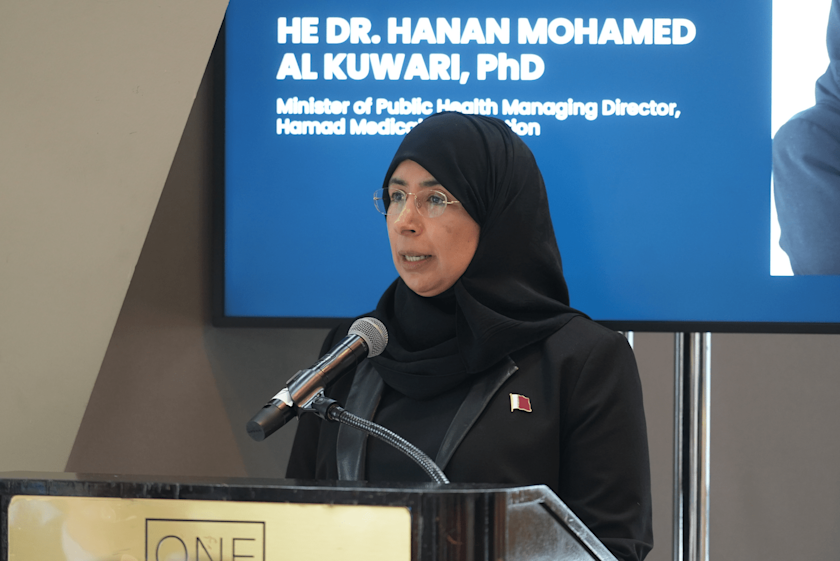
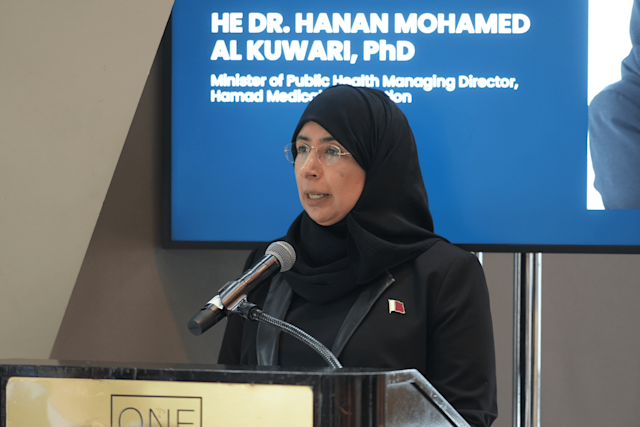
We recognize the immense potential for health, wellbeing, and economic benefits in shifting our focus from disease treatment to prevention. Achieving this transformation requires strong global partnerships to enhance healthcare outcomes and make preventative care a cornerstone of medical practice worldwide.
A Genomics Landmark
Groundbreaking genomic data was revealed and new research initiatives announced by QF’s Qatar Precision Health Institute (QPHI) in October – as a milestone in QF’s and Qatar’s precision health journey was reached.
QPHI released the largest genomic dataset in Qatar and the region, which will lay the vital foundations for research intended to place the nation at the forefront of genomics. It will make advancements possible in areas including cancer genetics, cardiovascular disease, and mental health, with advanced analytical tools being used to reduce the cost and length of this research.
Meanwhile, Season 16 of Stars of Science – QF’s edutainment TV show that is the region’s leading platform for fostering scientific innovation and entrepreneurship among Arab youth – concluded with Yaman Tayyar from Syria being crowned as the Arab world’s top innovator.
Tayyar emerged victorious for his ‘Geno’ microfluidic mixer, designed to produce lipid nanoparticles for gene therapy, with Haytham Yahyaoui from Tunisia claiming second place with ‘NeuroVox’, an app that uses AI and machine learning for the early detection of Alzheimer’s disease.
Groundbreaking genomic data was revealed and new research initiatives announced by QF’s Qatar Precision Health Institute (QPHI) in October – as a milestone in QF’s and Qatar’s precision health journey was reached.
QPHI released the largest genomic dataset in Qatar and the region, which will lay the vital foundations for research intended to place the nation at the forefront of genomics. It will make advancements possible in areas including cancer genetics, cardiovascular disease, and mental health, with advanced analytical tools being used to reduce the cost and length of this research.
Meanwhile, Season 16 of Stars of Science – QF’s edutainment TV show that is the region’s leading platform for fostering scientific innovation and entrepreneurship among Arab youth – concluded with Yaman Tayyar from Syria being crowned as the Arab world’s top innovator.
Tayyar emerged victorious for his ‘Geno’ microfluidic mixer, designed to produce lipid nanoparticles for gene therapy, with Haytham Yahyaoui from Tunisia claiming second place with ‘NeuroVox’, an app that uses AI and machine learning for the early detection of Alzheimer’s disease.


This is an opportunity for researchers to work with cutting-edge genomic data and create breakthroughs that can transform patient care.


None of this would have possible without Stars of Science. Their support allowed me to achieve in three months what I thought would take a year.
The Human Face of Healthcare
Innovations in healthcare that build resilience and leave no one behind – in a turbulent world where so many people are facing extreme hardship, they are vital.
And in November, health leaders, experts, and practitioners from across the globe converged in Doha to identify how to ensure healthcare provision is accessible and humane for everyone, at WISH 2024 – the seventh edition of the biennial summit of Qatar Foundation’s (QF) World Innovation Summit for Health (WISH).
Held under the theme ‘Humanizing Health: Conflict, Equity, and Resilience’, the summit discussed evidence-based ideas and practices in healthcare innovation, with the aim of addressing the world’s most urgent health challenges.
“War is a healthcare catastrophe,” Lord Darzi of Denham, Executive Chair of WISH, told delegates at the summit’s opening ceremony, attended by Her Highness Sheikha Moza bint Nasser, Chairperson of Qatar Foundation. “There can never be any justification for targeting healthcare personnel or infrastructure – it is purely and simply wrong.
“We must stand together to condemn such actions and honor those who courageously continue to provide care in the most appalling conditions.”
Innovations in healthcare that build resilience and leave no one behind – in a turbulent world where so many people are facing extreme hardship, they are vital.
And in November, health leaders, experts, and practitioners from across the globe converged in Doha to identify how to ensure healthcare provision is accessible and humane for everyone, at WISH 2024 – the seventh edition of the biennial summit of Qatar Foundation’s (QF) World Innovation Summit for Health (WISH).
Held under the theme ‘Humanizing Health: Conflict, Equity, and Resilience’, the summit discussed evidence-based ideas and practices in healthcare innovation, with the aim of addressing the world’s most urgent health challenges.
“War is a healthcare catastrophe,” Lord Darzi of Denham, Executive Chair of WISH, told delegates at the summit’s opening ceremony, attended by Her Highness Sheikha Moza bint Nasser, Chairperson of Qatar Foundation. “There can never be any justification for targeting healthcare personnel or infrastructure – it is purely and simply wrong.
“We must stand together to condemn such actions and honor those who courageously continue to provide care in the most appalling conditions.”
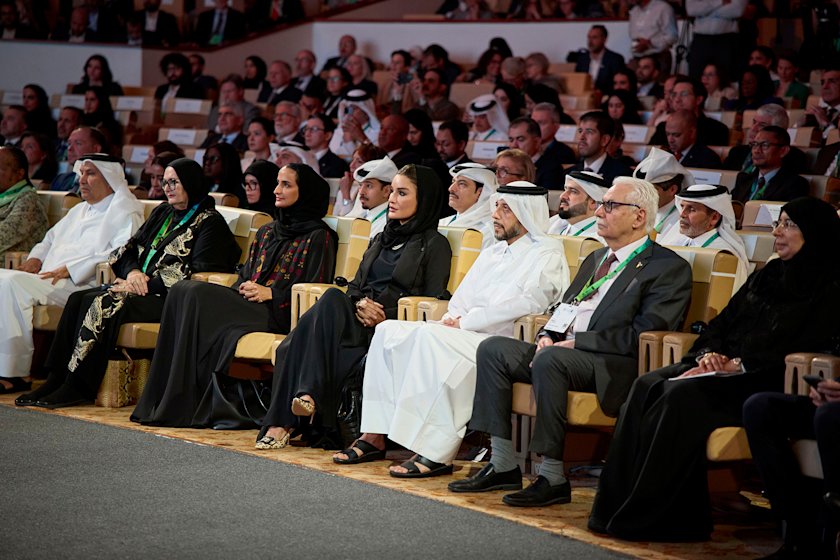
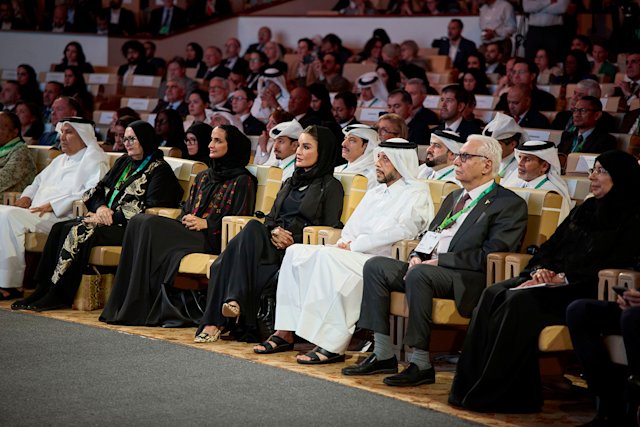
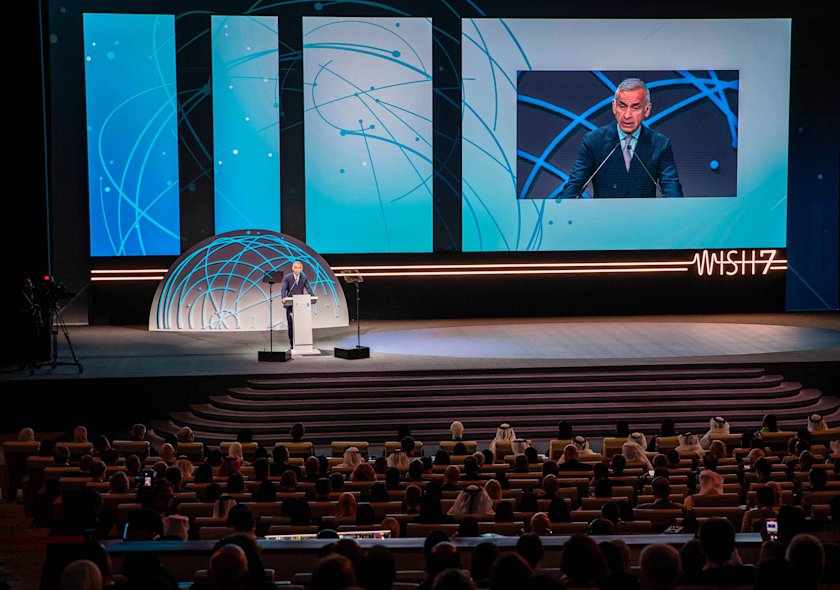
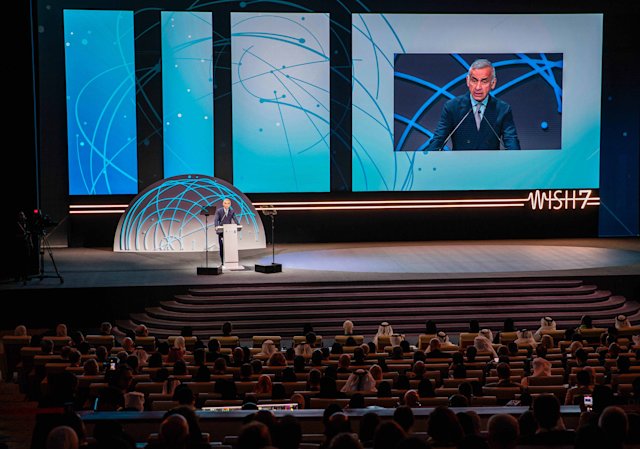
The toll of war and displacement has tested humanity’s resilience and underscored the urgent need for peace, health, and protection.
Tackling Challenges for a Healthier World
Ahead of the summit, WISH and the World Health Organization (WHO) entered a strategic partnership to develop a series of evidence-based reports and policy papers, as well as working with the United Nations’ health agency to develop a post-summit implementation strategy.
Reports published by WISH and WHO on topics including protecting healthcare amid armed conflict, eliminating tuberculosis among refugees and migrants, transforming palliative care, and the use of Artificial Intelligence in healthcare, were delved into through discussion forums, while sessions explored healthcare issues ranging from women’s cancer and antimicrobial resistance to childhood obesity and the impact of the war in Sudan.
Health innovators from Indonesia and the US took the spotlight as the winners of the WISH 2024 Innovation Competition, having established companies focused on AI-enhanced testing for cervical cancer, and automated, AI-powered ultrasound solutions for breast cancer screening.
And as the summit closed, it was announced that Qatar is to adopt the CARDIO4Cities approach – a data-driven cardiovascular population health initiative, created by the Novartis Foundation – and become the regional hub for its expansion across the Middle East and North Africa. CARDIO4Cities leverages the power of data to help nations make better-informed healthcare decisions.
Ahead of the summit, WISH and the World Health Organization (WHO) entered a strategic partnership to develop a series of evidence-based reports and policy papers, as well as working with the United Nations’ health agency to develop a post-summit implementation strategy.
Reports published by WISH and WHO on topics including protecting healthcare amid armed conflict, eliminating tuberculosis among refugees and migrants, transforming palliative care, and the use of Artificial Intelligence in healthcare, were delved into through discussion forums, while sessions explored healthcare issues ranging from women’s cancer and antimicrobial resistance to childhood obesity and the impact of the war in Sudan.
Health innovators from Indonesia and the US took the spotlight as the winners of the WISH 2024 Innovation Competition, having established companies focused on AI-enhanced testing for cervical cancer, and automated, AI-powered ultrasound solutions for breast cancer screening.
And as the summit closed, it was announced that Qatar is to adopt the CARDIO4Cities approach – a data-driven cardiovascular population health initiative, created by the Novartis Foundation – and become the regional hub for its expansion across the Middle East and North Africa. CARDIO4Cities leverages the power of data to help nations make better-informed healthcare decisions.
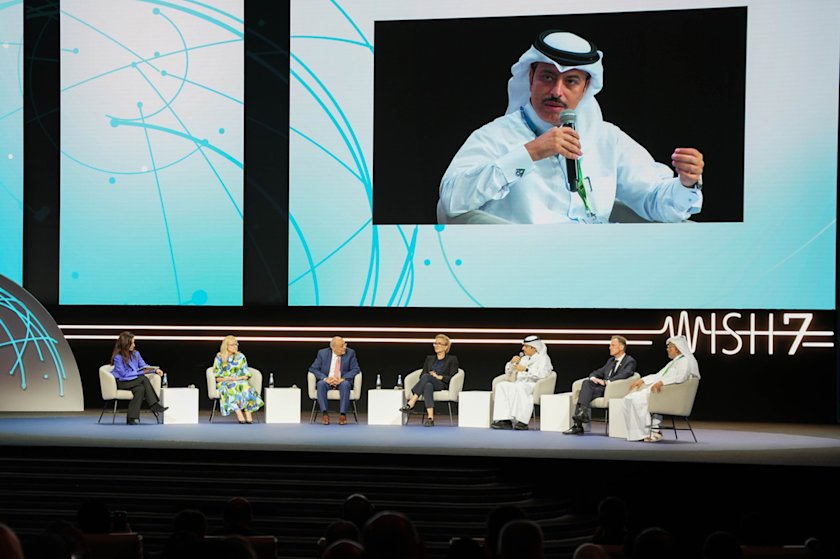
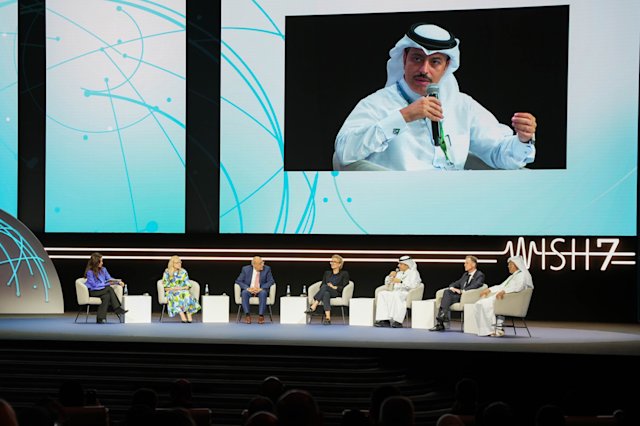
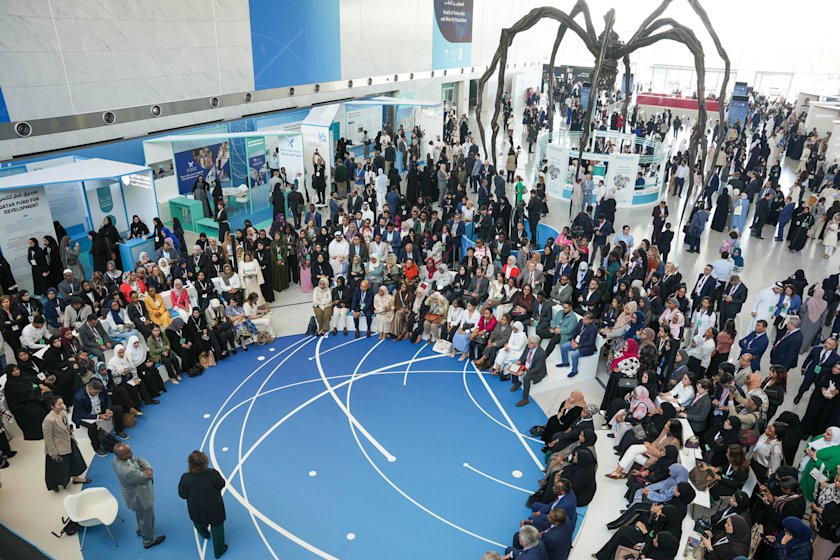
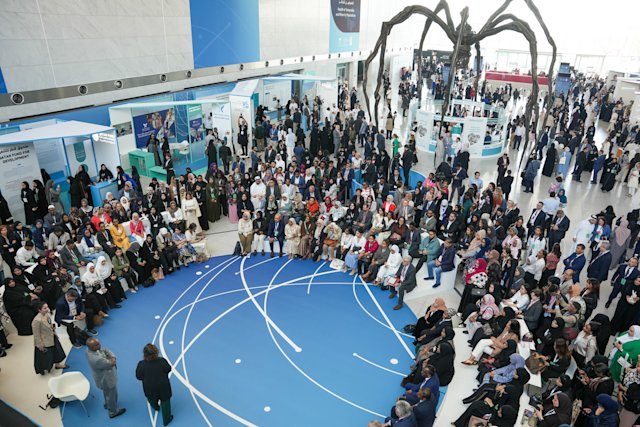
Participating in CARDIO4Cities offers Qatar unique opportunities to improve public health and drive innovation – collaborating with a global network of cities allows us to share knowledge, learn from each other, and be inspired by new solutions developed in different urban settings.
- The WISH 2024 Innovation Competition shortlisted 12 finalists from over 150 applications
- Since its launch in 2013, the WISH Innovation Program has supported 160 innovators from 41 countries
Spearheading a Scientific Renaissance
Almost two decades ago, QF formed the Arab Expatriate Scientists Network, with its aim being to help nurture a renaissance of the proud tradition of Arab science and research, by reconnecting scientists, intellectuals, and scholars with their roots in the Arab world – so they can contribute to its development and its future.
This network has now evolved into Arab Global Scholars (AGS): an innovation-focused community linking Arab scholars, research institutes, universities, and industry partners to advance science, research, and capacity-building projects from within Qatar. And in November, its members came together at the AGS Annual Gathering, held at QF member Hamad Bin Khalifa University (HBKU).
With its opening attended by Her Highness Sheikha Moza bint Nasser, Chairperson of Qatar Foundation, the three-day event saw internationally and locally based Arab experts join dialogues and workshops centered on crucial fields such as precision health and biotech, AI, cybersecurity, sustainability, and environmental health.
And the gathering also unveiled AGS’ digital platform: an interactive space introducing AGS members to an array of opportunities for collaboration, from research projects and academic exchanges to professional development opportunities – making geography no obstacle to impact being generated by Arab expertise.
Almost two decades ago, QF formed the Arab Expatriate Scientists Network, with its aim being to help nurture a renaissance of the proud tradition of Arab science and research, by reconnecting scientists, intellectuals, and scholars with their roots in the Arab world – so they can contribute to its development and its future.
This network has now evolved into Arab Global Scholars (AGS): an innovation-focused community linking Arab scholars, research institutes, universities, and industry partners to advance science, research, and capacity-building projects from within Qatar. And in November, its members came together at the AGS Annual Gathering, held at QF member Hamad Bin Khalifa University (HBKU).
With its opening attended by Her Highness Sheikha Moza bint Nasser, Chairperson of Qatar Foundation, the three-day event saw internationally and locally based Arab experts join dialogues and workshops centered on crucial fields such as precision health and biotech, AI, cybersecurity, sustainability, and environmental health.
And the gathering also unveiled AGS’ digital platform: an interactive space introducing AGS members to an array of opportunities for collaboration, from research projects and academic exchanges to professional development opportunities – making geography no obstacle to impact being generated by Arab expertise.
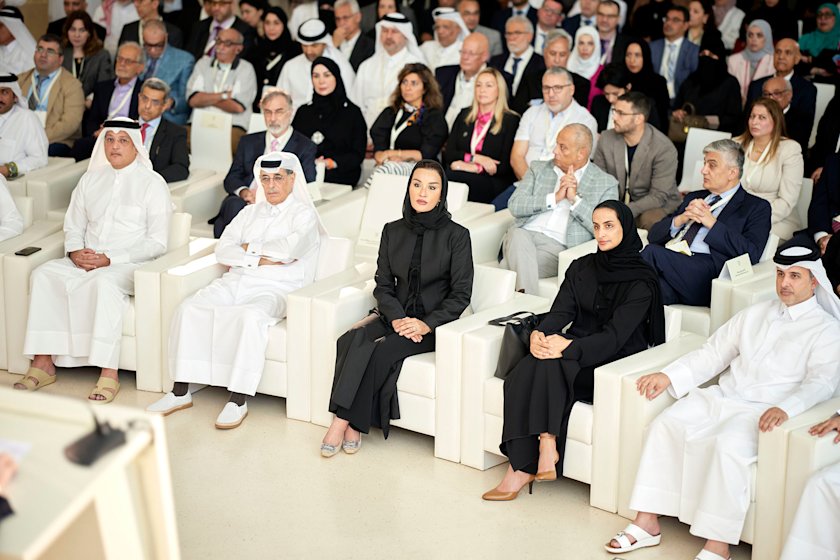
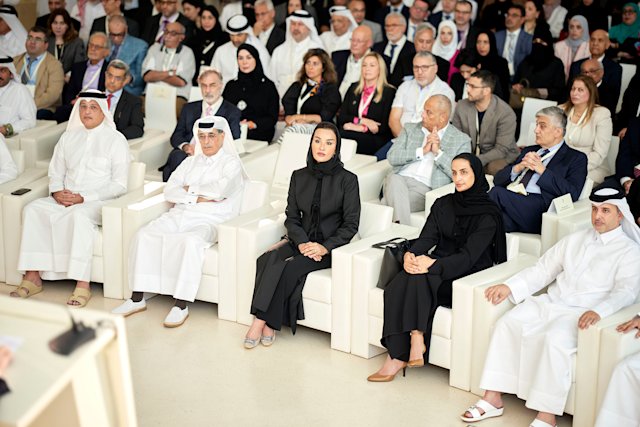
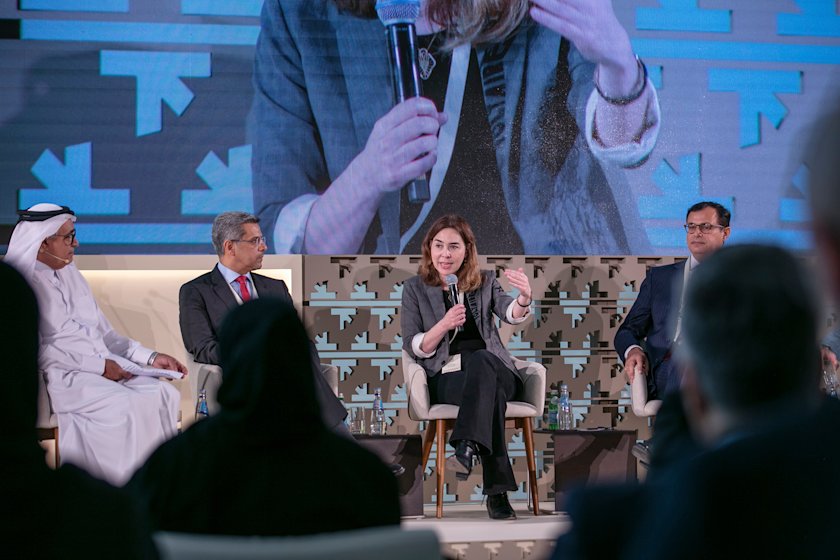
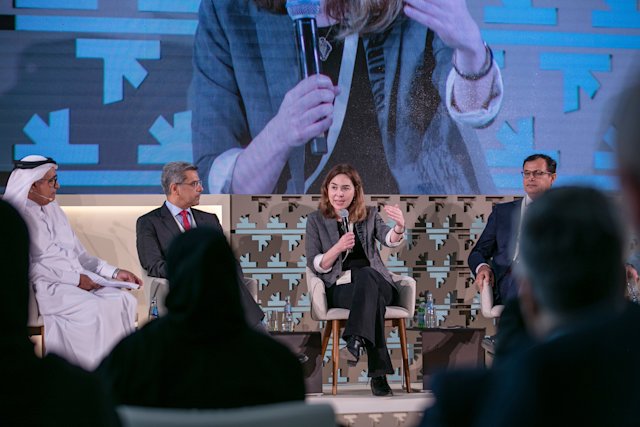
Today, AGS members may be based anywhere in the world, as through technology we explore new and different methods of collaboration, making it easier for everyone to contribute to ensuring this region is stronger and better able to overcome the challenges of the 21st Century.
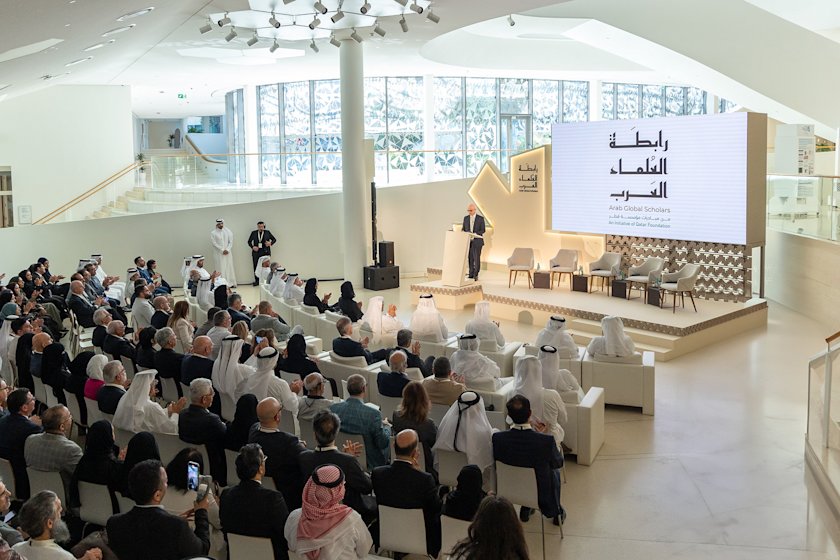
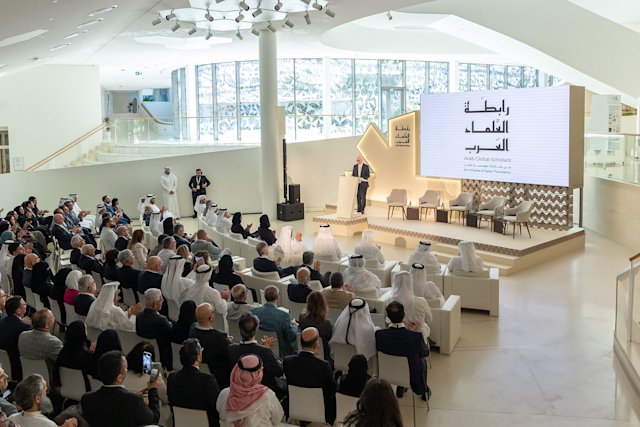
Pioneering for People
In the field of healthcare, November saw the clinical effectiveness of a QF-developed tool for assessing the risk diabetes poses to people in Qatar validated by one of the world’s leading public health journals.
And a pioneering study in reproductive medicine by QF’s Sidra Medicine received the Samir Abbas Best Research Award from the Middle East Fertility Society, with the women’s and children’s hospital and medical research hub also partnering with CellSave Arabia to launch Qatar’s first cord blood banking service – enabling families to preserve their newborns’ stem cells in the country for potential future medical needs.
Meanwhile, researchers at QF partner university Weill Cornell Medicine-Qatar (WCM-Q) published their insights into the awareness of attitudes of students in Qatar to the Human Papilloma Virus (HPV) infection – which carries a significant cancer risk - and its vaccine.
The university also highlighted to Qatar’s community the importance of adopting healthy practices through the workshops, competitions, and interactive sessions of its seventh Lifestyle Medicine Week; and hosted thought leaders in medical education from Qatar, Switzerland, the US, and the UK for a conference examining how technologies like AI, virtual reality, and augmented reality can enhance the way medicine is taught.
In the field of healthcare, November saw the clinical effectiveness of a QF-developed tool for assessing the risk diabetes poses to people in Qatar validated by one of the world’s leading public health journals.
And a pioneering study in reproductive medicine by QF’s Sidra Medicine received the Samir Abbas Best Research Award from the Middle East Fertility Society, with the women’s and children’s hospital and medical research hub also partnering with CellSave Arabia to launch Qatar’s first cord blood banking service – enabling families to preserve their newborns’ stem cells in the country for potential future medical needs.
Meanwhile, researchers at QF partner university Weill Cornell Medicine-Qatar (WCM-Q) published their insights into the awareness of attitudes of students in Qatar to the Human Papilloma Virus (HPV) infection – which carries a significant cancer risk - and its vaccine.
The university also highlighted to Qatar’s community the importance of adopting healthy practices through the workshops, competitions, and interactive sessions of its seventh Lifestyle Medicine Week; and hosted thought leaders in medical education from Qatar, Switzerland, the US, and the UK for a conference examining how technologies like AI, virtual reality, and augmented reality can enhance the way medicine is taught.
Thanks to our facilities and CellSave Arabia’s research, this is the first time that families across Qatar have the opportunity to have their children’s stem cells stored in the country. Together, we aim to make advanced stem cell processing and storage more accessible.
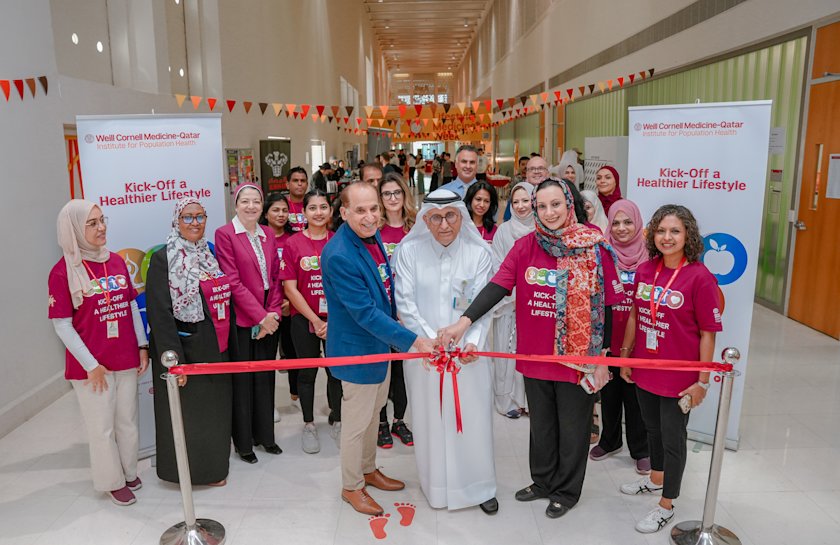
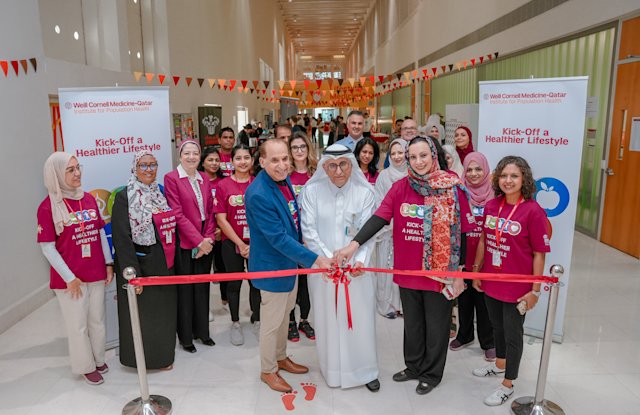
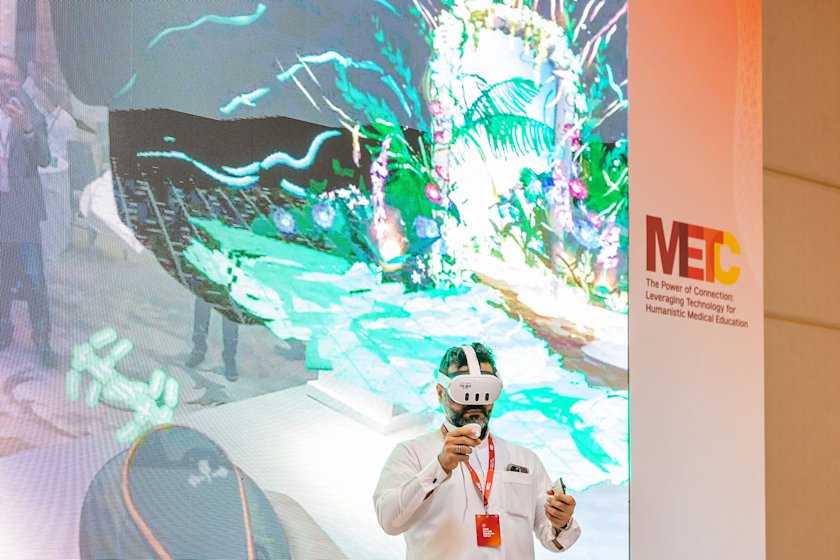
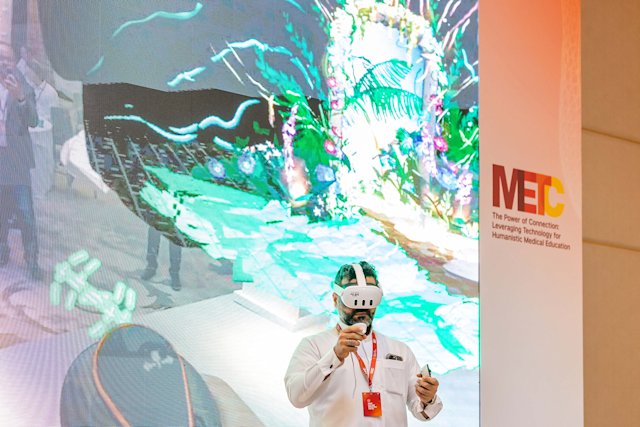
Sharing Insights, Making Breakthroughs
Global perspectives on personalized healthcare were shared at QF’s Education City as Sidra Medicine staged its Precision Medicine and the Future of Genomics Summit, where topics included Qatar’s potential as a hub of biomedical innovation, the role of international collaborations in driving genomics research, and the ethical, legal, and social implications of integrating genomic date into healthcare.
The world-leading women’s and children’s hospital also broke new medical ground, becoming the region’s first hospital to successfully perform a high-risk cesarean section, and carrying out Qatar’s first industry-sponsored pharmaceutical trial for pediatric congenital hyperinsulinism.
Meanwhile, crucial insights into how COVID-19 immunity and the evolution of viruses have shifted since the pandemic were unlocked through a study led by researchers at QF partner university Weill Cornell Medicine-Qatar (WCM-Q) and involving six Qatar-based institutions.
And WCM-Q’s Assistant Professor of Research in Population Health Sciences, Dr. Hiam Chemaitelly, received a top regional award for her contributions to infectious disease epidemiology – while HBKU faculty were also honored for their work in the fields of AI and 3D content, health education, and tackling global corruption in sports.
Global perspectives on personalized healthcare were shared at QF’s Education City as Sidra Medicine staged its Precision Medicine and the Future of Genomics Summit, where topics included Qatar’s potential as a hub of biomedical innovation, the role of international collaborations in driving genomics research, and the ethical, legal, and social implications of integrating genomic date into healthcare.
The world-leading women’s and children’s hospital also broke new medical ground, becoming the region’s first hospital to successfully perform a high-risk cesarean section, and carrying out Qatar’s first industry-sponsored pharmaceutical trial for pediatric congenital hyperinsulinism.
Meanwhile, crucial insights into how COVID-19 immunity and the evolution of viruses have shifted since the pandemic were unlocked through a study led by researchers at QF partner university Weill Cornell Medicine-Qatar (WCM-Q) and involving six Qatar-based institutions.
And WCM-Q’s Assistant Professor of Research in Population Health Sciences, Dr. Hiam Chemaitelly, received a top regional award for her contributions to infectious disease epidemiology – while HBKU faculty were also honored for their work in the fields of AI and 3D content, health education, and tackling global corruption in sports.


This summit serves as a platform for empowering knowledge sharing, where insights on cutting-edge research, clinical applications, and emerging technologies in genomics can be exchanged to shape the future of healthcare.




